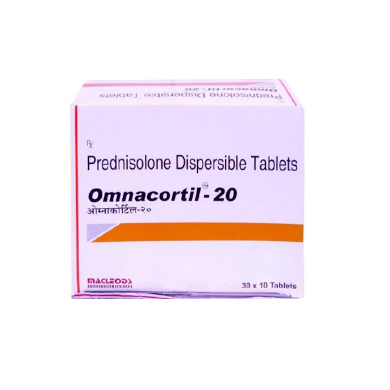Introduction to Omnacortil 20 mg
Omnacortil 20 mg is a corticosteroid medication known for its potent anti-inflammatory and immunosuppressive properties. It belongs to a class of drugs called corticosteroids, which are widely used in the treatment of various medical conditions.
Understanding Corticosteroids
What are corticosteroids?
Corticosteroids are synthetic drugs that mimic the effects of cortisol, a hormone naturally produced by the adrenal glands. They exert a wide range of effects on the body's immune response, inflammation, and metabolism.
How do corticosteroids work?
Corticosteroids work by suppressing the body's immune system and reducing inflammation. They inhibit the production of inflammatory substances and prevent certain cells from entering inflamed tissues, thereby alleviating symptoms associated with inflammation.
Indications for Omnacortil 20 mg
Omnacortil 20 mg is indicated for the treatment of various inflammatory and autoimmune conditions, including rheumatoid arthritis, asthma, ulcerative colitis, and allergic reactions.
Dosage and Administration
Recommended dosage of Omnacortil 20 mg
The recommended dosage of Omnacortil 20 mg may vary depending on the specific condition being treated and the individual patient's response to the medication. It is typically taken orally once daily, with or without food.
Administration guidelines
Omnacortil 20 mg should be taken exactly as prescribed by a healthcare professional. It is important to follow the prescribed dosage and administration instructions carefully to achieve the desired therapeutic effect.
Potential Side Effects
Common side effects
Common side effects of Omnacortil 20 mg may include:
- Increased appetite
- Weight gain
- Fluid retention
- Insomnia
- Mood changes
Serious side effects
Serious side effects of Omnacortil 20 mg may include:
- Increased risk of infection
- Glaucoma
- Cataracts
- Adrenal suppression
- Osteoporosis
Precautions and Warnings
Who should avoid Omnacortil 20 mg?
Omnacortil 20 mg should be avoided in patients with a history of hypersensitivity to corticosteroids or any of the inactive ingredients in the medication. It should also be used with caution in patients with certain medical conditions, such as diabetes, hypertension, and peptic ulcer disease.
Special precautions for use
Special precautions should be taken when using Omnacortil 20 mg in certain patient populations, including:
- Pregnant or breastfeeding women
- Children and adolescents
- Elderly patients
Drug Interactions
Medications that may interact with Omnacortil 20 mg
Omnacortil 20 mg may interact with certain medications, including:
- Nonsteroidal anti-inflammatory drugs (NSAIDs)
- Anticoagulants
- Antidiabetic agents
- Vaccines
Benefits of Omnacortil 20 mg
Omnacortil 20 mg offers several benefits for patients with inflammatory and autoimmune conditions, including:
- Rapid relief of symptoms
- Improvement in quality of life
- Prevention of disease progression
Risks and Considerations
Balancing benefits and risks
While Omnacortil 20 mg can be highly effective in treating inflammatory and autoimmune conditions, it is important to weigh the potential benefits against the risks of long-term use, including adverse effects on bone health, cardiovascular function, and immune function.
Long-term use considerations
Long-term use of Omnacortil 20 mg may be associated with an increased risk of certain adverse effects, such as osteoporosis, diabetes, and infections. Close monitoring and regular follow-up with a healthcare professional are essential for patients taking Omnacortil 20 mg long term.
Conclusion
Omnacortil 20 mg is a powerful corticosteroid medication that offers rapid relief of symptoms for patients with inflammatory and autoimmune conditions. While it can be highly effective, it is important to use it cautiously and under the guidance of a healthcare professional to minimize the risk of adverse effects.
